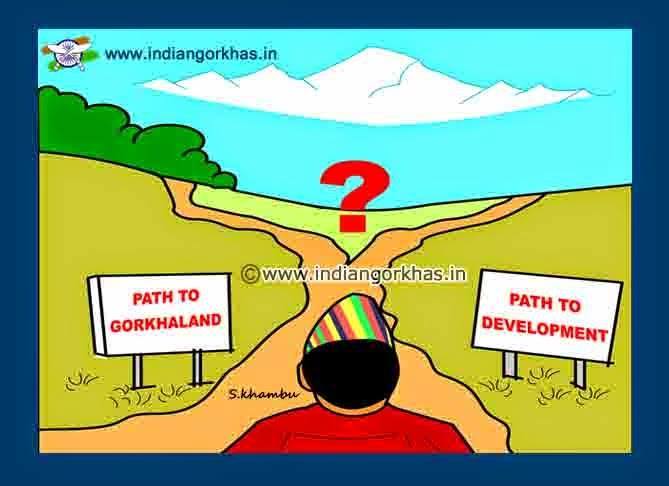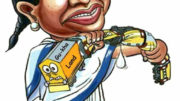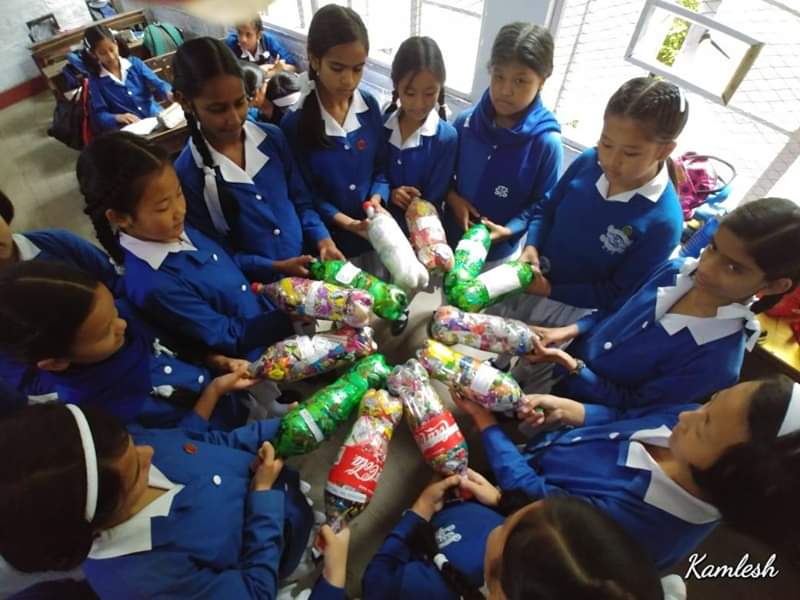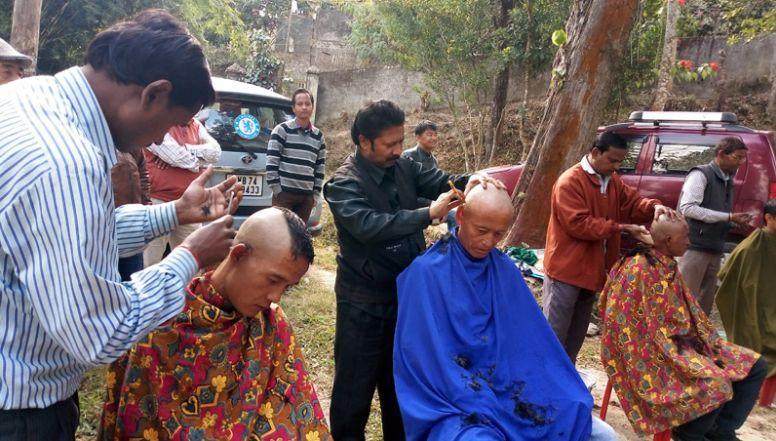“देखोस न देखोस यो वर्तमान… भावी पिडिले देख्ने छ… कसैले छद्म वेशमा, तिम्रो इतिहास लेख्दै छ… उत्सर्ग गर, उत्सर्ग गर… the present may not see the consequences, the future generations will have to live it, for someone somewhere is recording your actions today… do strive for good, do strive for better.” Beautiful lines by Laxmi Devi Sundas – poignant and inspiring! Every time I have felt hopeless, frustrated and disgusted by my observation of the whole political discourse on Gorkhaland, these lines have always perked me up… but not today.
The 2016 MLA elections are looming around the corner. The tall promises claimed by our political parties, their political alliances, the divisive rhetoric, cringing idiosyncrasies, personal vitriolic jibes and their respective election agenda’s have yet again brought under scanner the contentious demand for Gorkhaland (which is not a new thing) but what is different this time (in my opinion) is the underlying subtle threat against the very existence and sustenance of the demand – primarily arising out of the lumping or synonymously mixing up of the two words – Gorkhaland and Development. This has forced me to come out of my comfort zone to introspect on the demand for Gorkhaland vis-a-vis Development.
DEVELOPMENT?
I grew up at a time when the dominant narrative for the demand for Gorkhaland within the Union of India was that of “development”. As a child, I was not sure what “development” implied, but I did have some vague notions like – good roads, hospitals, schools and colleges, buildings, jobs, tourism, water, buses, etc. Looking back, I wasn’t quite off the mark from the notion of development that is held by the majority of the people in the Darjeeling Hills even today, including the so-called “intellectuals”. In the simplest sense, development is commonly understood as some process that will bring about economic (material) gains or benefits to our place and people. So, we shout out loud – hami lai Gorkhaland chahincha development ko lagi.
However, in the context of Wasted Bengal, please be reminded that this claim – we lack development, hence we need Gorkhaland – has been quashed and will continue to remain quashed on the simple premise that there are many other districts within the State that are even less (economically) developed than the Darjeeling region. So the notion of “development” argued in this manner can neither be seen as a necessary nor a sufficient condition for demanding Gorkhaland.
IDENTITY-CRISIS?
I later moved to Kolkata for my higher studies, where I experienced incessant inquiries (ok some were genuine curiosities) – on the grounds of where I was from, what language I spoke, how I looked, and to some extent, even my surname, which I initially enjoyed. But as these inquiries turned into racial slur that questioned my legitimacy to the very place I was born, that too over a stretch of 5 years, it began to dawn on me that the demand for a separate state should be much more than mere economic development.
Rightly so, back home, the narrative was beginning to change – from development to the “quest for national identity”. Gorkhas all over India, to some extent, seemed to be arriving at a consensus that the Gorkha communities in India are suffering from “identity crisis” and that the demand for Gorkhaland was/is the only solution to their problem.
For a while, this resonated with me but as I began to introspect more on this new construct of “identity and identity-crisis”, I realized that the term “identity-crisis” might not have been an appropriate word to describe our situation in the first place. Erik Erikson (1966) first coined and conceptualized the term ‘identity-crisis,” described it as “a time of intensive analysis and exploration of different ways of looking at oneself”.
Now, do we not know who are? The ignorant as well as malicious inquiries, doubts and mistrust with which we are perceived outside Darjeeling Hills, stems not from our “identity-crisis” but from the NON-RECOGNITION of our already existing identities.
In addition to our National Identity, we have multiple identities – ethnic, religious, indigenous identities, etc. So the Gorkhaland demand isn’t about “we are seeking national identity because we are suffering from an identity-crisis,” but for seeking recognition for the already existing identities of the Gorkhas in India – in particular, recognition of a place-based identity (more on this later).
I see no substantial merit in pushing forward for Gorkhaland statehood on these above-mentioned ground. Alternatively, we can re-conceptualise or re-think the demand for Gorkhaland, but this time around, not on grounds of ‘development’ or ‘identity-crisis’ as we have done in the past but on our basic rights to FREEDOM.
Freedom to “live the kind of lives that we value living”, freedom to choose, freedom to decide for our own selves, freedom to live a dignified life, freedom to GOVERN ourselves; and most importantly, freedom from the injustices that have plagued our people for decades under Wasted Bengal. For way too long we have simply followed what our leaders have said, this time around, let us listen to our hearts and reflect on the un-freedom and injustices that we have been consciously and unconsciously experiencing.
To put it simply, I want Gorkhaland to live a dignified life. Period.
INJUSTICE
If you look around, much of our grievances arise from not having control over our resources, not being able to take our own decisions, not being able to get recognition for our place, people, language, our history, bad governance, lack of responsive and responsible administration and so forth. These grievances that we experience are nothing but manifestations of INJUSTICES – either in the form of unfair and inequitable distribution of resources, funds, opportunities or in the form of discrimination, apathy, indifference towards our people and our region. INJUSTICES also manifest in the form of lack of participation in decision-making processes and non-recognition of our culture, communities, languages, etc. You will find plenty of examples under each of these categories.
As a consequence of these pervasive injustices, we have become handicapped and are living like second-class citizens, with an occasional derogatory tag of a foreigner thrown in, in our own PLACE – a place (i.e. Darjeeling Hills) that is imbued with meanings, our history, our values, our people, our culture and traditions – that remains controlled by the “bhadraloks” in Kolkata, who also decide for us.
However, the sad part is that, till date, we have not been able to relate these grievances as forms of injustices and therefore, have completely internalized it. Perhaps this is what Rutgurd Boelens meant when he wrote, – “The more a discourse is internalized by people, and accepted as true and legitimate, the stronger the influence of the prescriptions it establishes, and the stronger its self-fulfilling forces, actions and effects.”
To wrap it up, Gorkhaland for me is a demand for freedom – freedom from the injustices that we, under Wasted Bengal have suffered, are suffering and will suffer. Gorkhaland for me is a demand for freedom – Freedom to live a dignified life that we value living. Of course, one can argue, that development itself can be viewed “as freedom” (but again, this calls for another piece and is not applicable for the current election scenario). In any case, I don’t want to give our idiotic political leaders the benefit of doubt – economic development is their selling quotient.
So, my dear readers, for once, let our emotions rule our heads, let us put our rationality aside, and let us recall all the sacrifices of our people in the past who gave their lives, youth, career, homes and loved ones during our previous agitations for the realization of Gorkhaland; and let us VOTE – for Gorkhaland, and for showing to Bengal that we remain united in our quest to be separated from their colonial rule.
I know, the choice may be difficult – the tradeoff between our immediate needs (i.e. economic development right now) might seem more appealing to many and outweigh our long-term need for freedom, but please do keep in mind that if the party that is opposing the very formation of Gorkhaland (i.e. TMC) gets one chance to put its feet in our place THIS TIME (through our very own JAP or GNLF) – forget about fighting and sustaining the demand for Gorkhaland, we may not be able to resurrect it for the coming couple of decades.
So vote for Gorkhaland!
Although development and Gorkhaland are supposed to complement each other as they are ‘ends and means’ in and of themselves, yet this time around the idiotic politicians have polarized these issues and turned it into a fight for Development vs. Gorkhaland. Given this, I want to remind you all that development may not get us Gorkhaland, but Gorkhaland will definitely bring in development.
Let our actions today, help in laying down strong foundations for our future generations. Let us give them reasons to be proud of our choices and are taking a stand against Wasted Bengal and anyone supporting them… Let us not give our future generations a reason to look back at our actions of today and curse and regret our actions, just as we regret the actions of those who sold out our dreams earlier.
“देखोस न देखोस यो वर्तमान… भावी पिडिले देख्ने छ…”
[Cartoon via: Indian Gorkhas]






Be the first to comment on "“Development” Vs. “Gorkhaland” – What Are You Voting For?"